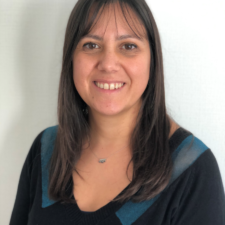Director of Research, INSERM
Nantes, France
About Carole Guillonneau, PhD

Career path
1. How did you first get involved in immunology?
I discovered immunology at university as a student. I immediately became fascinated by the possibilities and complexities of the field. So I applied for training in a lab of immunology and I would go to the lab almost every day after university classes or during holidays to be trained and also to follow the work of a team of researchers. Once I graduated with my Master’s, I knew I had to embark on a PhD in immunology. And I was fortunate enough after that to do a post doctorate in Nobel Laureate Peter Doherty’s Laboratory in Melbourne, which really convinced me that immunology was the field I wanted to work in. After my postdoc, I was recruited as a permanent researcher in France to lead a group at the Center of Research in Transplantation and Translational Immunology in Nantes. And I never regretted since then working in the field of immunology.
2. Tell us about the research you’re most proud of.
My team aims to better understand the mechanisms of action taking place in autoimmune diseases and transplant rejection with a particular focus on Tregs and to develop new immunotherapies for treatment of these patients based on these mechanisms of action. Most of these patients have no treatment options or relapse after treatment. So, although I am proud of all of the research I’ve done, I’m particularly proud of the latest project I’ve led developing three new therapeutic strategies for the clinic for the patient. And one of the strategies uses a monoclonal antibody, which selectively depletes the cell’s involvement in the disease, while boosting the regulatory cells. This antibody is now under GMP production, and we will start a clinical trial soon in 2024. I’m very proud of this success. I will also mention that I’m proud of the work we’ve led and done in the last decade to better understand a population of Treg which is not very much studied, the CD8+ type Tregs, and for which we are also preparing a world first clinical trial.
3. What is the most important trait a researcher should possess and why?
That’s probably curiosity, the first and most important one, but I think also probably pugnacity and tenacity. It’s not an easy field. There is competition. It might be difficult sometimes to get funding and some of the time your experiments don’t behave as you would like them to. You have to rethink things, to adapt, so you have to believe in what you are doing.
4. What is the biggest lesson you’ve learned?
I probably learned many lessons, but maybe the biggest is that I think it’s really important to collaborate as much as possible with the best people possible. This is a tremendous help for you and your project to move forward in the right direction. And I probably learned a lot from this collaboration with very good people in the field. This is true for any aspect, like even grant or paper writing. You learned a lot from these people.
5. What advice would you give to young researchers just starting out in the field?
To persevere, probably. It’s not always easy to establish your group or to get a grant to fund your research projects. Sometimes you can be demotivated, but anything is possible if you love what you do. You should persevere and put in as much effort as possible.
6. Describe your average workday.
Since COVID, I would say that my average workday maybe has changed a little bit, but usually I have two to three meetings and most of them are still virtual. Some of them are in person. I write grants or papers. I read emails and reply to those many emails that we receive. And what I love the most is to discuss with the team members the new results that we have in experiments – success or failure, what to do, what to do next. I think what is very important is that I am very happy to go to work every day, every single day, because I know that every day is different.
Work with FOCIS and FCE's
8. Switching gears, how did you first get involved with FOCIS?
My center has been working with FOCIS several years. I’ve been working in the FCE Center many years and I’ve been exposed to FOCIS very early on in my career. I attended many FOCIS annual meetings, which I really like. I also attended FCE courses for the Entrepreneur in Clinical Academia or the Advanced Course in Basic and Clinical Immunology. I even participated in these meetings by giving invited lectures. From my point of view, the annual FOCIS meeting is really a must attend meeting. It’s a meeting I would not miss every year. The program is really terrific and the attendees are top level.
9. How do you think FOCIS has changed your world?
What I like about this annual meeting is that we have the opportunity to meet new collaborators, both clinical, but also from the scientific side, which is not the case in many meetings. It has allowed me to present my research in front of this cross disciplinary, transdisciplinary audience. I think what is also very good is that FOCIS is sponsoring the travel of students, so I always try to get my student to attend the FOCIS meeting, thanks to this travel support that they can receive.
10. If your colleague asked you why they should join FOCIS, what would you tell them?
I would say that the meeting is always very good and that he or she will meet a lot of great scientists and that this is critical to building new collaborations. FOCIS is also really helpful in sponsoring these travel grants for students to attend meetings.
11. We’re going to talk a little bit now about your FCE. Can you tell us about the research that you’re doing?
My research objectives are the analysis of immune responses and tolerance induction in the context of transplantation rejection and autoimmune diseases. I work both at the basic and the translational level. This is why FOCIS really fits what I am doing. I have had a particular focus for several years on CD8+ regulatory T cells, both on basic aspects, such as their phenotype, function or antigen specificity, but also on clinical aspects such as their role in pathological situations and potential as cellular therapy product like CAR-Tregs. We are even part of a European consortium, RESHAPE, to perform the world’s first trial using polyclonal CD8+ Tregs in kidney transplant patients. We are also developing new immunotherapies that I mentioned before to induce tolerance using, for example, anti-CD45RC mAbs or the IL-34 cytokine. For both these therapies, I co-founded a startup, AbolerIS Pharma, which is developing these products for first-in-human clinical trials. So my research is really all about these different aspects.
12. What is the vision/your dream goal of your FCE?
I would like to continue what has been started by the previous FCE director, to continue to raise the awareness about the FOCIS society and the different actions FOCIS is taking so that more and more people, including students, attend the annual meeting or participate in the courses that FOCIS is proposing so they have the opportunity to meet new researchers and clinicians and potentially start new projects and new collaborations.
13. What are your biggest challenges?
The biggest challenge is to try to secure funds. I think that’s something researchers always have to do so that the research can continue at the same level that we are at currently and finding the time to do so is also the biggest challenge.
14. Why did you apply to be an FCE?
I think it’s for the visibility. It’s a great opportunity for a center to be represented and to be known internationally for research in immunology by other center key researchers in the field.
15. Anything else to add?
I would like to say that again, FOCIS is a great organization and the actions of FOCIS are really good for researchers in immunology. I’m very happy and proud to be part of FOCIS.
Those are all the questions for today, thank you for your time.
